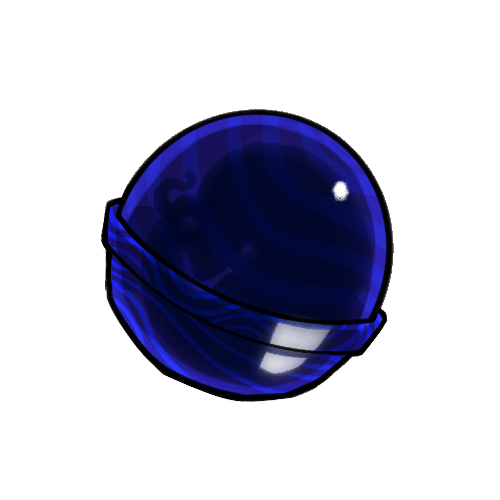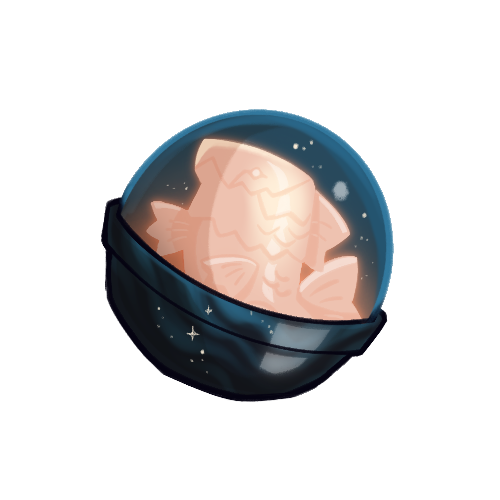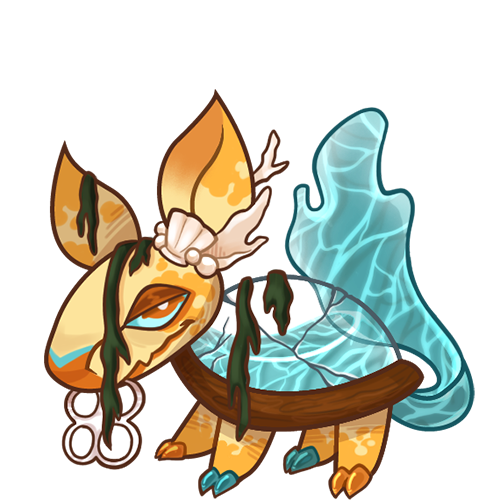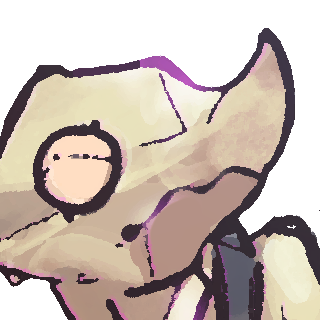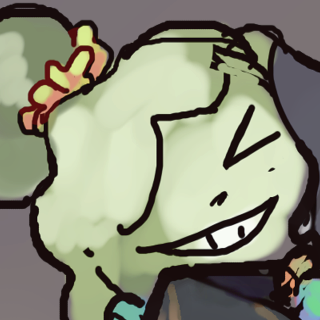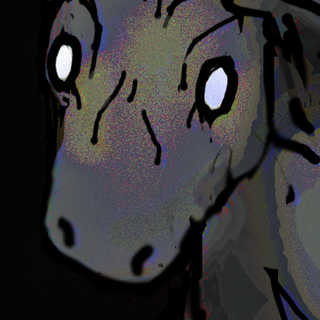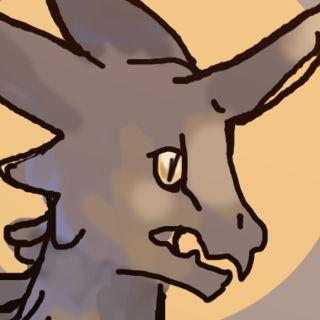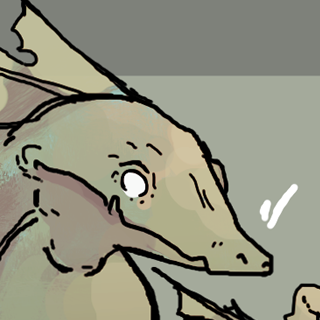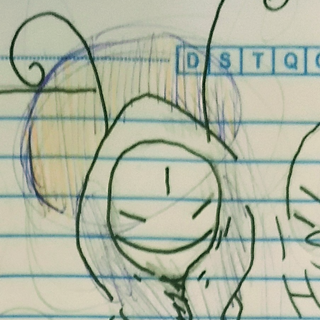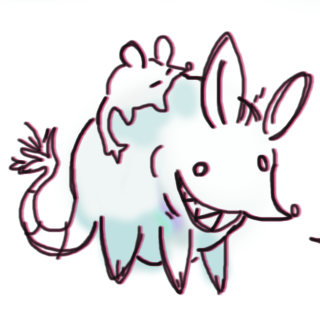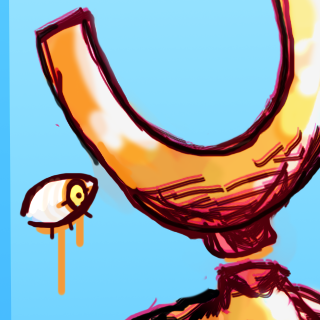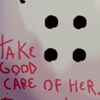[Cosmosdex] The Universal Encyclopedia
[Cosmosdex]
Lammar
Sinister / Lammar#4878
Lammar

Art by, excalibur
- Strength-10
- Intelligence-1
- Charisma-10
- Endurance-4
- Agility-1
- Luck-10
Gallery Art: 48
Likes: Talking, Being Pretentious, Anime, Rambling, Fairy Tales, Project Moon
Dislikes: Cucumbers, Eggplants, Onions
Friendship Level: ★★★★★☆☆☆☆☆
Phrase Of The Day:: If you want peace, prepare for war!
Traits
I don‘t understand it, but it feels a lot like magic.
You were a scratch on paper, ink and a voice not meant to look back at me.
Slowly but Surely, the Earth continues to spin…
10-20-30 Million Dollars, ready to be spent!
Anytime, Anyplace, Anywhere At All!
It‘s like they say you gotta buy one to get one free!
And I‘ve got the feelin‘ someone‘s gonna be cuttin‘ the thread!
I‘m fickle about both changing and unchanging things
Now it is coming to you, giving off a stench and devouring your shadow.
Links
Uwahh: :3cPhysical Description
You can tell how things will go by how they start, or at least your brain thinks it can. Isn‘t that infuriating sometimes? There you are, trying to enjoy a good story, and your mind continually presents you with expectations and predictions, cliches and tropes, like a butler who won‘t take a hint. The first second of a movie and you‘re already thinking about how it will end, how it will tunnel and twist through the street blocks of plot and character and environmental detail. Or at least, you might be, if you‘re used to it. Pattern-matching is a hard leash to escape.
With that said, time for something else.
Nosebleeds, or "bloody noses" as they‘re called sometimes, happen to around 60% of people at least once in their lifetime. They are, if not common, at least mundane occurrences, brief periods of inconvenience that interrupt a day until they finish. You have likely had a nosebleed before, and you likely know many other people who have had one too. They‘re frequent enough in fiction, too. There‘s nothing like a nosebleed to show a character straining in some non-physical way, to spice up a scene that might otherwise consist of nothing but grunting and teeth-grinding, to give a sense of ripping one‘s internal self apart under the pressure. Gives a rough edge to otherwise supernatural abilities, magical or psychic powers with none of the gritty texture that skills in real life possess.
But to have a bad nosebleed feels different, a rough edge of its own making itself known. It is not simple. Watch.
It starts with a tickle in your nostrils. A light sensation, no pressure or pain, just a tiny presence your breath passes over, wetting the inside of your nose. It is a dribble of mucus, you might assume, the outflow of congestion caused by a change in the seasons. You sniff, and wipe your nose with your hand or a tissue, the simple action barely registering in your conscious experience. The movement takes a couple seconds at most, and is one that you might perform dozens of times a day, never thinking twice about such an automatic response.
You feel something wet on your hand, and look down. The fluid is red. As you stare, you notice the sensation of something slow and sticky pooling in the rim of your nostrils, the liquid balanced such that it might trickle out if you move too fast. Small rivulets test the edge of your philtrum, held from falling only by their own viscosity. A metallic scent begins to make itself apparent to you, rich and coppery.
Depending on what you were taught, you might pinch the sides of your nose immediately, restricting your air flow to your mouth. A few drops of blood are squeezed out, and you feel them splash on your hands and lips. The fluid left outside your nostrils begins to dry, leaving a red stain.
But the bleeding doesn‘t stop. You feel the pressure begin to build, veins jettisoning their cargo into the empty volume available to them. Your fingers begin to feel sticky, and when you tilt your head back, blood trickles down the back of your mouth. As you continue breathing, your throat begins to dry, and every time you swallow, you feel a tremor pass through your nose, an invisible pressure differential made perceivable through blood.
You try to sit as still as possible, keeping your hand steady. The clots slowly forming tickle the inside of your nostrils, an itch that is impossible to scratch. Time passes, and you begin to wonder if you can release your hand, if the wound has been repaired. You pay attention to the minute perturbations occurring inside your nostrils, gradually shifting your grip to discern the solidity of the fluid within.
Over the course of multiple minutes, you slowly release your fingers, leaving red marks on your skin. You quickly press a tissue to the unoccupied area, catching the released drops. You wait to make sure.
Slowly, the flow resumes, a small stream pushing past the clotted blood, brushing past your nostril hairs. The gap is not yet fully sealed, and the liquid stubbornly refuses to solidify. You press your nasal cavities closed again, squirting out a small jet of clotted blood from the newly restricted place. You resign yourself to waiting longer.
As the backed-up mixture of mucus and blood drips down your throat, you are left with two options: spitting it out, or swallowing it. You tilt your head further forward to avoid the choice‘s necessity, though the pressure within your nostrils becomes greater.
You distract yourself as you wait, trying to pass the time faster. You do not want to release your grip until you are absolutely sure the bleeding has ceased. The dryness of your throat grows worse, and drinking from a cup is near-impossible without leaning your head backwards. You attempt to use a straw, though every time you stretch your mouth or cheeks, you feel the blood shift in your nose, adapting to the altered dimensions of its prison.
Finally, after waiting for a dozen more minutes or so, you are certain. You remove your hand, wiping it off on a tissue. The ridges of your nostrils are coated in a sticky, dark red substance, a brittle shell that you check with a finger, scraping a little off. It itches.
You still cannot breathe through your nose, as it is completely clogged, even if nothing is falling out anymore.
Over the next half hour, the remaining liquid clots together, forming a slug-like mass residing in your nose. As air begins to pass through your nostrils once more, the friction drags the slug backwards, sliding down your throat with a visceral weight and momentum. It sits on your tongue, tasting of iron and water.
Once again, you either spit it out, or swallow it.
You dab at your nose with a tissue, removing the last few flecks of blood, though even after a night‘s sleep, you find bits of dried blood upon sneezing.
There. Wasn‘t that something? Did you smell anything, did you sniff or sneeze in that contortion of reddish physicality? Rich and dusty, like the chewed-out inside of a coal mine.
Maybe you learned something you didn‘t know, or at least, didn‘t feel. Your body edits out feelings constantly, so it can come as something of a surprise when you do feel them. Did you know that your hands can feel much smoother and softer than you‘d think? There is this tactile illusion (a short child, often overshadowed by its much bigger siblings, visual and auditory illusions) where you place your hands on either side of a series of wires with your palms touching, and slowly move your hands across the mesh. The result is a slippery sensation akin to that of a sheet of velvet, hence the unoriginal name, the velvet hands illusion. All your skin, your nerves are feeling is just other parts of your skin, and a few wires. Amazing.
It‘s reminiscent of pain, in a way. You can feel the temperature of something, but when it becomes too hot, or too cold, it stops being temperature, and just falls down to the level of boring pain, like a toy helicopter that‘s out of power. Even more so because it turns out that mixing the sensation of mild warmth and mild cold also causes pain (once again, the tactile illusion comes through in the clutch! This time its guise is the thermal grill illusion, which, well, you get the idea).
The nose itself is a prime example (ironic, coming back to that). It‘s in your vision all the time, but you don‘t see it. Because it‘d be distracting, obviously. Your nose is attached to your face, you don‘t need to know it‘s there. If it was missing, you‘d be able to tell in a lot more ways than with your sight. There is simply no reason for you to see those blurry inches of tissue a few centimetres away from your eyes, so you don‘t. There are more obvious examples that could be named, but those are something of a dead horse, so to speak. Even mentioning that there‘s a more obvious example might‘ve brought to mind that example and caused it to activate, like a virus coded to open file explorer when you look up book reviews (it doesn‘t really do anything but it‘s kind of annoying, maybe).
Personality
Anyway, maybe that‘s enough, for now. A bit much, yeah? Like what was that even about? It was rather slippery. So here‘s something else. Somewhat less niche than nose bleeds, though not applicable to everyone.
One thing that surprisingly few people tell you about driving, when you‘re just starting out, is that it‘s mildly terrifying. Terrifying, because you could crash and die, and mildly, because you don‘t. You start off learning how to drive in car parks and empty streets, getting a feel for steering and parking, tapping the brake playfully, making the vehicle shake a little as it stops and starts, stops and starts, never going above a speed you could run at. Ideally, no one else is around to watch you doing this. You‘ve learned the basic rules, you had to in order to get a licence at all (note, mileage may vary on technical details located herein depending on regional origin), but when you first get in the car, you don‘t remember much of that. Not yet, not until it‘s drilled into you by your parent or sibling or friend or instructor. You turn on the windscreen wipers instead of indicating, you steer left instead of right when reversing, you forget to look in the mirrors over and over.
All part of learning, naturally. Driving is a better example of learning through failure than many things. A field of skill and knowledge that you always took for granted starts opening up to you (side note, did anyone else ever assume that you used both feet while driving, one for the accelerator pedal and one for the brake pedal? That‘s one of those things no one ever talks about), adding new context to trips you spent talking, or reading, or just doing anything that didn‘t involve being directly aware of the hunk of metal encasing you.
Eventually, you gain enough little experience to go out on the road. The real road, that is, the multiplayer experience, where other cars inhabited by commuters who actually need to get somewhere. They keep overtaking you, flowing around you like water past a pebble. But it‘s not that bad, hopefully. Everyone was in your position once, and most people in a lot of places are at least somewhat empathetic. Just as long as you don‘t do anything stupid, they can forgive you for being slow. So don‘t do anything stupid.
But it‘s hard not to think about what you‘re doing. It hasn‘t slipped past the threshold from competent to automatic yet, it still requires your conscious focus and attention. And that‘s when a little bit of terror might come and sit in your lap, especially when you start going fast. Fast enough for a crash to hurt, and then fast enough for a crash to kill, even odds at least. Your first time on the highway might be one of the most gut-wrenching things in your life up to that moment, because there will be real and immediate consequences if you mess up too badly.
You don‘t, of course. You pay better attention to the rules of the road than the majority of people around you, if anything. It‘s a little annoying, really. You‘re being a good little driver, while around you people aren‘t slowing down at stop signs (when the road ahead is clear), or are going a little above the speed limit (so they can overtake you). And of course, they don‘t have any struggle with any of it, not that you can tell. Other motorists are probably humming along to themselves, chatting away casually and enjoying the ride, while you have to bear an immense pressure on your back, keeping you uncomfortably focused and attentive.
You look at your rearview mirror, then your driver‘s mirror, then the opposite side mirror, then you snap back to the road in front of you because you were only paying half-attention while looking at all the mirrors. A few seconds later, from the corner of your eye you see something moving up and you glance at the mirror again, and then a second time because you didn‘t look at it long enough, and it‘s just another car overtaking you again, but subconsciously your reflexes shift the wheel to turn away from the approaching vehicle, and you veer just a little to one side. You‘re still within the lines, the white lines that mark your course like the racetracks athletes run on, you didn‘t leave them. But it occurs to you that those lines don‘t actually hold any power. There is no force holding you within them, no gentle nudging that will occur if you get out of position, no invisible wall that stops you from hitting the curb. Only you cause the car to stay in place.
Sometimes it‘s surprising that the biggest causes of car accidents are speeding, drinking and going on your phone, when it feels like just making any mistake at all, just missing the timing or looking in the wrong direction for a few seconds could spell calamity. And how often do you make such mundane mistakes in your everyday life? Nobody‘s perfect, after all.
But, odds are, the worst that‘ll happen to you is messing up a parking spot and scraping someone else‘s car. The average driver experiences a collision only once every one hundred and forty thousand miles or so, as meaningless as that statistic is. You still hit the brakes when the lights ahead of you turn yellow, even if you could‘ve made it, and you‘d still rather wait for the truck in front of you to turn off instead of overtaking it, even if it is going a bit slow, but each hour on the road brings you more confidence, more self-assurance. Even when you go out in rainy weather, late in the evening, you feel alright, even enjoying a bit of banter with your co-rider. You have your beams set on high, you‘re keeping a safe distance from the car in front of you, and you‘re looking forward to getting home so you can tuck in to that pizza you bought, or maybe watch a movie (or probably just go on your computer and draw or write stuff like a dork). You pull up neatly at a set of traffic lights.
And then you hear an awful screeching sound from behind you, and you have just enough time to wonder what it is before everything goes flying. It‘s too sudden.
A moment of suspended animation passes, and then you collide with the car in front of you as well.
You feel strained painfully against your seat belt, the strap tightened around your chest. Your arm hurts from where you knocked it into the dashboard. You ask, is everything okay? Is anyone hurt? I think I‘m fine, I don‘t think I‘m hurt, it‘s okay. You‘re breathing faster. Everything‘s been knocked around. Your foot is still on the brake. You find a pen on the floor beside the pedals, and make sure to remove it. The moment of collision, the moment that just happened, is oddly slippery in your memory, absent. As if your mind didn‘t expect it to be important, and so didn‘t make room to store the details in time before they fell away. It occurs to you to put the car into park. And then, finally, you think of looking back, and see that the rear window of your car has shattered, the frame around it crumpled, the smoking hood of the vehicle behind you sitting still and silent, as if it is a guilty child awaiting their punishment.
The guy in front is pretty mad at you. He gets over it when he sees what happened to your rear end though. And the crasher is closer to tears than anything else, going on about how the brakes wouldn‘t work and how sorry they were. Most likely, they‘d just been going fast enough that the wet road caused them to skid instead of stop. You all exchange insurance details, but that‘s not important, not to this. Not to the memory that sticks in your mind, one moment of peace followed by a sudden upset of the natural order. When you next go driving, it takes a while for it to leave your mind.
And then, well, that‘s about all there is to get out of that, wouldn‘t you say? All the little emotions and metaphors, how much deeper could you delve into them, unfold them, before they became ostentatious and arduous?
Well, a lot longer, to be fair. Other people have done it much longer. There is a lot that could be said about engines, for instance, and how they‘re actually kind of insane if you think about them. But that‘s not what this kind of thing is for, here and now.
You see, the point is… actually that‘s not really a good direction, it‘s rather ruinous in fact. But there is something else that feels worth saying.
History
There exists a certain painting in the world. Imagine this painting. What are the artistic themes of this painting?
Hard question, right? What if you were told that the painting contains a woman and a tiled surface? A sunset and a sea? A very small chair and either its shadow or reflection (it‘s hard to tell which)? Abraham Lincoln? Does the theme emerge yet?
You could read a detailed description, stating that the painting has a section with the appearance of varnished wood in its upper left and upper right corners; In the upper right the border of this section is a jagged series of right angles, the specific dimensions of which are, starting from the very top of the painting and a distance d from the left side, go down x, then go left y, then go down z… additionally the shading of the wood section lightens the further away it is from the corner, asymmetrically of course. This painting in particular consists of numerous solid squares of colour, or at least mostly solid, which would make describing it easier. For instance, there is a green square around the lower left of the painting, and on top of which is a dark blue square, and to the left of this square is another green square.
Can you tell what the themes are yet? Well, perhaps that isn‘t fair. This is a very partial description after all. But imagine a fully comprehensive description in this vein, stretching out to thousands of words. Do you think after reading it, you would be able to tell what the themes are?
The answer is probably no, because that description is garbage. Obviously. The clearest way to communicate the themes would be to just tell you them. Even though that‘s not how themes are presented, is it? They are illustrated, embodied through patterns, not formalised as their definition. That is to say, art things represent themes, they have thematic elements, the artist doesn‘t just put a label on it saying "this is a theme", or at least, they don‘t just do that. The hero slays the demon, and the theme is demonstrated. The sunlight banishes the darkness, and the theme is demonstrated. The true answer turned out to be the friends you made along the way, and the theme is demonstrated.
So, basically, just do it yourself if you feel like it. There is no narrator here, not a single utterance of the self. There is just you.
Special
One last thing, as a treat:
There once was a foul thing that cried.
It withered and groaned and lied.
The chains in its head
Were useless and dead
So no one noticed when it died.
Credits
Creator / Writer of:
Hyperion |
Duckarium | Mettaet | Eulara | Nerodrake |
Anatida |
Mycat |
Q-7 |
Artist of:
Phoebe | Hera |
Conscience | Richife | Aalor | Ashlaiz | Cnidan | Larry | Svlanoi | Garduian |
Demioti |
Cloud-Gulper | Space Bear | Space Tuna | Dan'Gersign |
H. Monster |
Animal |
Cyclops |
Trivia
• Written by 1011686


